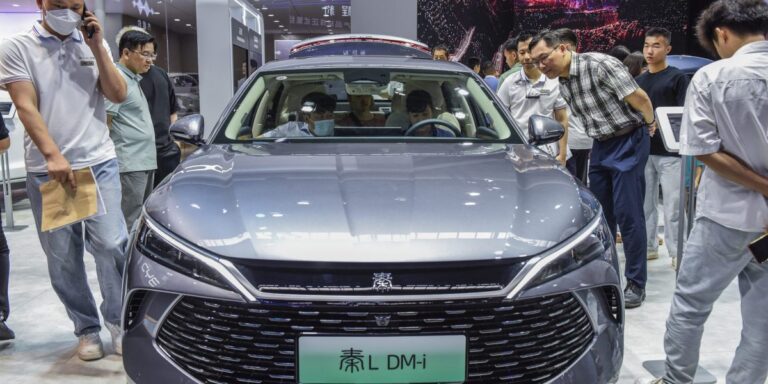Bank of America analysts believe Detroit automakers General Motors, Ford and Stellantis should exit the highly competitive Chinese market “as soon as possible” to focus on the United States.
“I think it makes sense from a pure profit and strategy standpoint to exit China to focus on where the profits are, which is trucks in North America,” John Murphy, an auto analyst at Bank of America, said Tuesday. Detroit News And CNBC.
GM made big money there in the 2010s, raking in more than $2 billion a year in revenue at its peak when it sold 4 million vehicles there, thanks to its long history there through its century-old Buick brand.
But sales and profits are falling due to the rise of domestic rivals such as BYD and Geely. GM expects its China sales to fall to 2.1 million vehicles in 2023 and lost $106 million in its most recent quarter, its third loss in 15 years.
The situation is even more sour for Ford and the former Chrysler Group, which merged with France’s Peugeot Citroen and is now known as Stellantis, which have so far failed to capture a sustainable large share of the local auto market, now the world’s largest, with car sales hitting a record 30 million last year.
As a result, Murphy argued that the loss of funding in China will put pressure on the three companies’ operations. He added that the three companies should exit “as soon as possible” and reallocate resources to developing a lineup of electric vehicles that can compete with Elon Musk’s Tesla.
“Focus on your core business,” Murphy said at an event hosted by the Automotive Press Association to launch the bank’s annual “Car Wars” report. “China is no longer a core strategy for GM, Ford or Stellantis.”
If the three companies decide to withdraw from China altogether, Musk’s Tesla will be the only American car brand that can compete in all three of the world’s biggest auto markets, including North America and Europe.
But GM doesn’t seem interested in giving Musk or its Chinese competitors the satisfaction. A company spokesman pointed to CEO Mary Barra’s comments in April that the company remains focused on the market, cutting costs while at the same time adding new products in China, including plug-in hybrids and luxury imports such as the Chevrolet Tahoe and GMC Yukon.
Ford, meanwhile, has been profitable for the past three consecutive quarters after years of losses in China, including a $572 million loss in 2022, and has said it has no plans to pull out of the country.
“Our participation in the world’s largest car and electric vehicle market gives us knowledge we can leverage to lead and win as a global business,” a Ford spokesman said. luck.
Detroit can’t catch up with Tesla while making up for losses in China
Chinese automakers have steadily squeezed weaker Western brands by hiring mostly European car designers to build stylish cars and produce them with low-cost labor in state-of-the-art factories. Many brands have also gained access to technology developed overseas through joint venture transfers or outright acquisitions of Western brands like Volvo.
Chinese consumers spend huge amounts of time and money on seamless apps like WeChat, and they have high expectations from technology, too, so they expect the same from their cars.
Indeed, one of the reasons Volkswagen’s ID-series EVs, long the market leader in China, failed to live up to expectations was that they were perceived as poor value for money, mainly due to weak infotainment systems and substandard software compared to competitors.
Meanwhile, Tesla, which pioneered the concept of electric cars with remote over-the-air updates, remains competitive today by comparison, even though the hardware – the cars themselves – is already considered ordinary by Chinese consumers.Furthermore, with the sole exception of GM’s Buick, Detroit brands like Ford and Chrysler lacked the tradition, premium appeal and technology.
But China’s recent deflationary recession, sparked by the collapse of its real estate market, has led to a brutal price war that many Western automakers are unable or unwilling to follow, prompting domestic brands to seek success in healthier export markets abroad.
The Detroit automaker is facing a choice: Do it still have global ambitions, or do it want to cut into the huge lead Musk’s company enjoys on the costs of building electric vehicles?
“This is going to be crucial to ultimately being able to compete with Tesla on price and cost,” Murphy added. “It just doesn’t make sense to ramp up production at this point and take a loss.”

